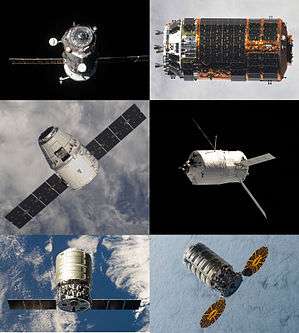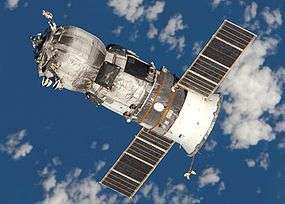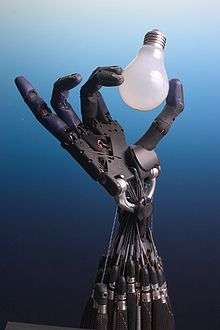Cargo spacecraft

A collage of automated cargo spacecraft used in the past or present to resupply the International Space Station
Cargo spacecraft are robotic spacecraft that are designed to support space stations operation by transporting food, propellant and other supplies. This is different from space probes, whose missions are to conduct scientific investigations.
Automated cargo spacecraft have been used since 1978 and have serviced Salyut 6, Salyut 7, Mir, the International Space Station and Tiangong space laboratory.
Spacecraft
Current spacecraft
- the Russian Progress spacecraft[1]—developed by Russian Federal Space Agency
- the Japanese H-II Transfer Vehicle[2]—developed by the Japan Aerospace Exploration Agency
- the American Dragon spacecraft[3]—developed under contract from NASA by SpaceX, a private spaceflight company
- the American Cygnus spacecraft[4]—developed under contract from NASA by Orbital ATK, a private spaceflight company
- the Chinese Tianzhou spacecraft[5]—developed by the China National Space Administration
Defunct or retired projects
- the Soviet optionally-manned TKS spacecraft
- the European Automated Transfer Vehicle[6][7]—developed by the European Space Agency. The last vehicle, Georges Lemaître ATV, completed its mission in February, 2015.
Spacecraft in development
- A variant of the CST-100 crew transportation vehicle has been proposed by Boeing for cargo delivery.[8]
- In January 2016, NASA announced that Sierra Nevada Corporation's Dream Chaser had been awarded one of the contracts under the second round of the agency's Commercial Resupply Services contracts. NASA committed to purchasing a minimum of six resupply missions to the ISS.[9]

Canceled projects
- The American private-sector Kistler K-1 from Rocketplane Kistler saw its contract with NASA terminated in October 2007 when the company failed to meet objectives. The contract was re-awarded to Orbital Sciences Corporation.[10][11]
See also
References
- ↑ Gunter's Space Page: Progress-M 1M - 10M (11F615A60, 7KTGM).
- ↑ "NASA Sets Briefing, TV Coverage of Japan's First Cargo Spacecraft". NASA. Retrieved 2009-09-03.
- ↑ "F9/Dragon Will Replace the Cargo Transport Function of the Space Shuttle after 2010". SpaceX. 2008-12-23. Retrieved 2010-02-15.
- ↑ "Canadarm2 Captures Cygnus".
- ↑ "China launches its first unmanned cargo spacecraft". phys.org. 2017-04-20. Retrieved 2017-04-20.
- ↑ ESA Automatic Transfer Vehicle
- ↑ Thales Alenia Space ATV & ISS Modules, archived from the original on 2010-07-06
- ↑ Space News: Boeing Offers CST-100 for ISS Cargo Contract (16 December 2014)
- ↑ "NASA Awards International Space Station Cargo Transport Contracts". January 14, 2016.
- ↑ Space.com - Rocketplane Kistler Appeals NASA Decision to Terminate COTS Agreement (22 October 2007)
- ↑ Orbital Wins $171 Million Space Station Re-Supply Demo Deal (19 February 2008)
This article is issued from
Wikipedia.
The text is licensed under Creative Commons - Attribution - Sharealike.
Additional terms may apply for the media files.

